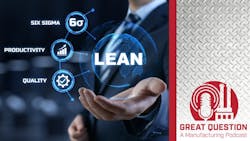Podcast: Lean manufacturing Q&A – Industry professionals answer your questions
Dave Rizzardo is the associate director of the Maryland World Class Consortia, and he co-developed the Lean Peer Group service. He currently facilitates multiple groups and works directly with organizations in helping them on their lean journeys. Carl Livesay is the general manager at Mercury Plastics MD and has more than 40 years of senior operational leadership in the manufacturing industry. Carl is a lean practitioner and serves on the BOD for the Maryland World Class Consortia. Sarah Tilkens is a senior operations manager of operational excellence at GE Healthcare and the CEO and founder of The KPI Lab. She has over 15 years of experience in lean, six sigma, strategy execution, and project management. Dave, Carl, and Sarah recently spoke at IndustryWeek’s Operations Leadership Summit in June. During the panel, “Sustaining Your Lean Gains,” the three explored methods of embedding lean to minimize transformation stalling or backsliding. In this episode of Great Question: A Manufacturing Podcast, Robert Schoenberger, editor in chief of IndustryWeek, shares the audience questions and expert answers from the session.
Below are some key quotes from the podcast:
I just think it's so interesting because I've been part of so many initiatives. We're like, OK, we're going after OEE, and we're taking a top-down approach, and every different part of our process is going to follow these rules, and we envision evolution in this one specific way. But, like you guys know, that doesn't work because every process performs way different. Measuring first-pass yield for one might be their secret sauce. Measuring uptime for another might be more valuable.
But what's interesting is, again, when you think of the way that we deploy leadership programs, we are still taking a very blanket-style approach where you're going to learn from this weird e-learning thing with this really diverse cast of people that we've put. And it's just like, that's not what actually creates next-gen powerhouse leaders. I mean, maybe it works for some people, but I think the opportunity is in thinking about talent development and talent optimization in the same way that you would think about optimizing a process. It’s slow and methodical, and one person at a time, and you get people like me, and you have these ripple effects, and you start a damn revolution.
But if you're not willing to innovate in that space, you're going to get what you've always gotten. So, it's like, who owns talent optimization in your organization? HR? Lean? The people leaders? Nobody? If that many people own it, who owns it? So, I think it's just worth challenging the ways that we're thinking about doing this because, again, you can have the best CI talent in the world, but if you can't keep your people and if you can't use your people well, that's a bummer. – Sarah Tilkens
Now as far as “how do I get the most out of them?” That's what the team leader, that's what the person in leadership, that's their job is to cultivate the strengths of the people that are on the team and recognize who does a better job of sorting or fine motor skills, or who solves problems quicker and put them in positions. You find the best second baseman, put them on second base. Don't put them at first. But the first baseman and the second baseman, they’ve got to work together because they’ve got to make that double play. So you can't have them antagonizing one another or not collaborating. It just physically doesn't work. I'm not trying to diminish anything that you get from the report. Maybe you can get that same information from the reports, but you can also get it by getting those people together and just having a conversation. It really doesn't take that long. – Carl Livesay
About the Podcast
Great Question: A Manufacturing Podcast offers news and information for the people who make, store and move things and those who manage and maintain the facilities where that work gets done. Manufacturers from chemical producers to automakers to machine shops can listen for critical insights into the technologies, economic conditions and best practices that can influence how to best run facilities to reach operational excellence.
Listen to another episode and subscribe on your favorite podcast app
About the Author
Robert Schoenberger
Robert Schoenberger has been writing about manufacturing technology in one form or another since the late 1990s. He began his career in newspapers in South Texas and has worked for The Clarion-Ledger in Jackson, Mississippi; The Courier-Journal in Louisville, Kentucky; and The Plain Dealer in Cleveland where he spent more than six years as the automotive reporter. In 2013, he launched Today's Motor Vehicles, a magazine focusing on design and manufacturing topics within the automotive and commercial truck worlds. He joined IndustryWeek in late 2021.
